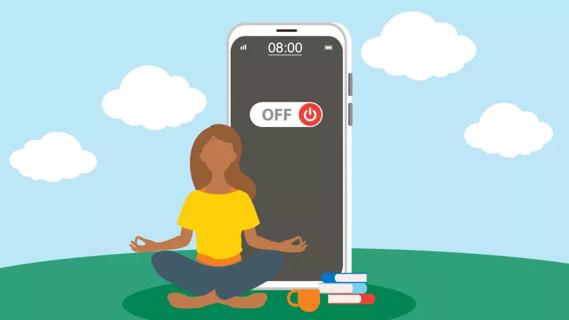How taking in too many gruesome stories can impact your well-being

From podcasts to documentaries to nonfiction books, it seems like the true-crime genre is bigger than ever these days. But how much is too much?
Advertisement
Cleveland Clinic is a non-profit academic medical center. Advertising on our site helps support our mission. We do not endorse non-Cleveland Clinic products or services. Policy
It can be all too easy to get lost in the kind of grisly tales that nightmares are made of — and what started out as a hobby born of curiosity can easily take a toll on your mental health.
Psychologist Chivonna Childs, PhD, explores why people are obsessed with true crime and the psychological effects it can have.
People who don’t have any interest in true-crime stories might think you’re a creep for enjoying them — but rest assured that your love of the macabre doesn’t indicate a tendency toward criminal behavior. Instead, Dr. Childs says, it’s as simple as curiosity.
“Watching true crime doesn’t make you strange or weird,” Dr. Childs says. “It’s human nature to be inquisitive. True crime appeals to us because we get a glimpse into the mind of a real person who has committed a heinous act.”
Most true crime lovers are fascinated by the likes of Jack the Ripper, H.H. Holmes and Ted Bundy out of a deep desire to better understand their unthinkable capacity for cruelty. “We want to see how they tick,” she says.
Research shows that true crime stories disproportionally appeal to women. That makes sense, Dr. Childs says, as women are also disproportionately likely to be the victims of crime.
Advertisement
“We want to watch true crime in part to learn how to avoid being a victim,” she says. “It can teach us to be prepared in case we’re ever in that situation.”
But there’s a darker side, too.
“Shows that focus on murder and rape can really take you to a bad place,” Dr. Childs says. “They can help you become more vigilant and aware, but you don’t want to become overly reactive to the point where you’re not leaving your house, you’re not socializing, you’re not functioning.”
And it’s not just true crime stories that can impact our psyche. Fictionalized depictions of crime can be just as captivating — and have similar impacts.
But that doesn’t mean you need to stop watching Law and Order: SVU or listening to “My Favorite Murder,” if you love them. It means that you should remain vigilant about how they affect you, paying special attention to your reactions.
Dr. Childs runs through some of the psychological impacts that crime shows can have — and signs that you may need a break.
“I always tell people that too much of anything is a bad thing,” Dr. Childs says, “and when we watch too much true crime, we start to worry about the what-ifs. It can cause us to isolate and to not fully live our lives.”
If you start to feel fearful every time you go out — or you sometimes feel too scared to go out at all — that’s a sign that your true-crime habit is negatively infringing on your everyday life.
Just as crime content can make you feel unsafe out in the world, it can also affect how safe you feel in your own home.
“If you’re double-checking and rechecking locks and doors, consider whether your true crime habit has started to interfere with your life,” Dr. Childs says.
When you’re constantly consuming stories that reveal the worst parts of humanity, you can start to doubt the humanity of the people around you. In small doses, this can be a good thing. Again, a certain level of true crime intake can teach you survival skills. But too much of it can make you overly suspicious to the point of paranoia.
“You may find yourself worrying whether the person you’re chatting with at the grocery store isn’t actually as nice as they seem,” Dr. Childs says. “When you start asking yourself questions like, ‘What if they have dead bodies in their basement?’ you probably need to take a step back and consider your crime intake.”
Too much true crime ceases to be about curiosity and starts becoming fear-based instead. “When we start to feel worried and afraid all the time, it takes away the fun of it,” Dr. Childs says. “It starts to instill anxiety in us instead.”
Advertisement
If you feel as though you’re constantly on the verge of impending doom, your true crime habit may have turned a corner into negativity. Other symptoms of anxiety include:
Try to pay attention to how you feel when you watch or listen to crime stories. Are you excited to delve deeper? Or do you feel nervous, anxious, depressed, stressed?
“Pay attention to any decline in your mood, like if true crime doesn’t feel as good to you as it used to,” Dr. Childs says. “Look, too, at how your body responds to the stories. If your heart is racing, or you feel tense or anxious, or you have moments when you think, ‘Oh, God, I can’t take this anymore,’ those are all signs.”
It may not be immediately evident to you that your true crime habit is having a negative impact on you. But stopping to consider how the stories make you feel in the moment can help clue you in to whether you should walk away from them now and try again later.
“Your body is going to tell you how much is too much,” Dr. Childs says.
You don’t need to swear off all your favorite true and fictionalized crime shows forever. But the old adage “Everything in moderation” applies.
Advertisement
If you’re having negative reactions to the stories, it’s helpful to take a step back from your habit for the moment — and even if you’re not having negative reactions, you can help keep them at bay by monitoring your crime intake.
“Break it up every now and then,” Dr. Childs suggests. “Go listen to music, a comedy or something else frivolous in between crime stories to keep things from getting too heavy.”
Advertisement
Learn more about our editorial process.
Advertisement

It isn’t a recognized mental health disorder, but research shows that problematic social media use can negatively affect your mental health, self-esteem and sleep

Too much blue light, especially from digital sources, may lead to eye strain and computer vision syndrome

When done in excess, watching TV can disrupt your sleep and lead to physical inactivity and social isolation

Imagination, completing tasks and social interactions are all key benefits for your brain

They’re fun to watch, but medical TV shows are often more hype than reality — and you shouldn’t rely on them for factual medical information

Embrace mindfulness and practice checking your phone consciously, not compulsively

Identify your triggers, set ground rules for your break and start practicing mindfulness

Too much screen time and unrealistic expectations and perceptions and can lead to an increased risk of anxiety and depression

Wearing a scarf, adjusting your outdoor activities and following your asthma treatment plan can help limit breathing problems

Your diet in the weeks, days and hours ahead of your race can power you to the finish line

When someone guilt trips you, they’re using emotionally manipulative behavior to try to get you to act a certain way